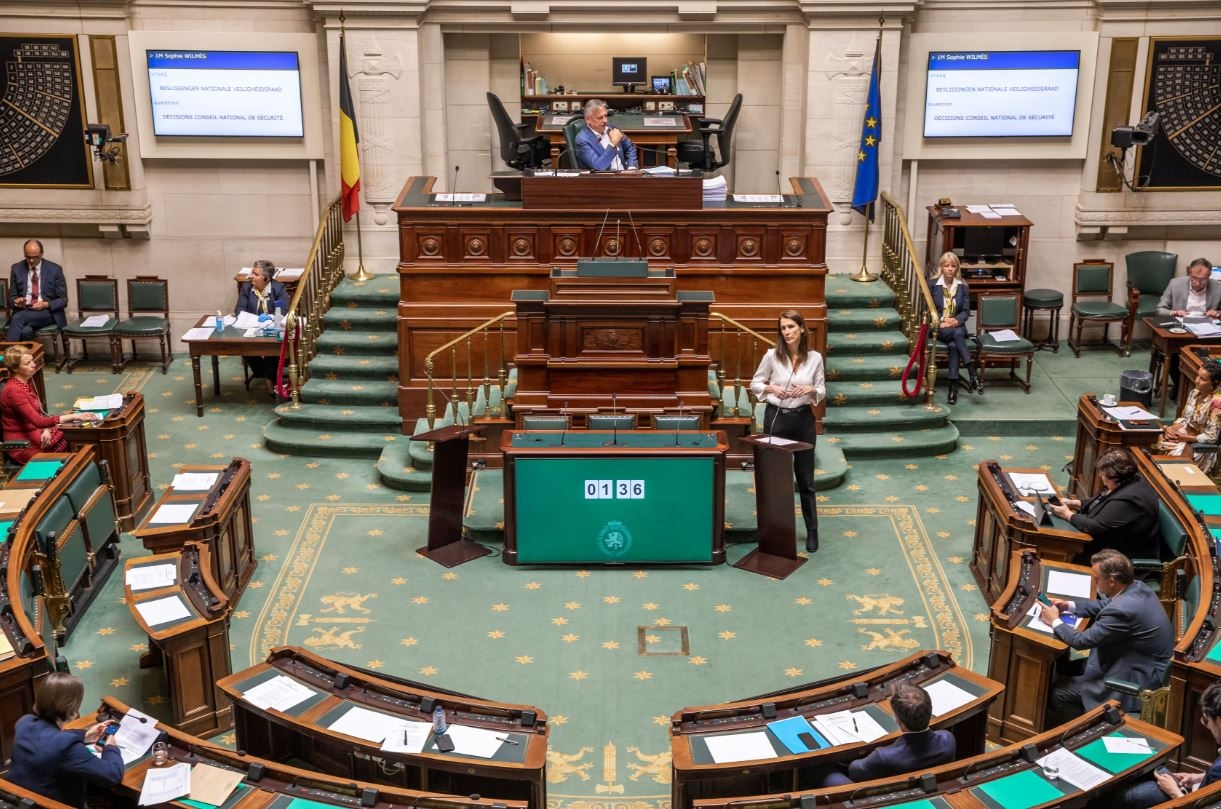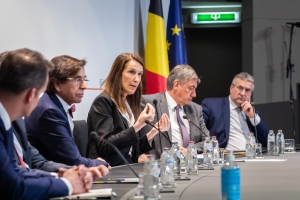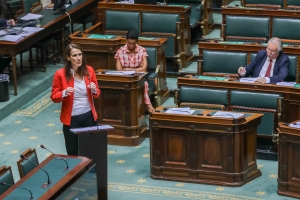Response to parliamentary questions on the decisions made by the National Security Council
Check against delivery.
Thank you for your questions, which I will come to in a moment.
But first, as always, I would like to take this opportunity to thank all our citizens for the huge effort they have been making for a month now. I understand the problems, the sense of isolation and also the frustrations this situation brings with it.
However, compliance with the measures is vital to save lives. This effort is not in vain. On the contrary in fact, it is improving the health situation.
For example, information from our national public health institute Sciensano shows that the number of new hospital admissions for COVID-19 has fallen slightly since the week beginning 6 April. Admissions to intensive care also seem to have plateaued since 3 April. While these are encouraging signs, they are no reason to let up.
I know there are now those who are tiring somewhat of this situation and are not always putting their best foot forward. Indeed, we are seeing an increase in non-compliance.
We are all yearning to get our freedom back, to be with our loved ones and friends again, and to return to some semblance of normality in our lives.
However, I must reiterate that this is a time now for us to keep up our hard work in order to save lives and protect the most vulnerable among us.
I am thinking here in particular of the older members of our society, who are at particular risk. As you know, because it is much discussed, the situation in nursing and care homes is very difficult.
And on this subject, I would like to start by reiterating our desire to continue working in partnership with the communities and regions to respond to this pressing matter, as we did by providing Ministry of Defence personnel.
In the same spirit, our increased testing capacity will be used to test all nursing-home residents and staff over the next three weeks.
The results of these tests should allow nursing homes to tighten up their measures to prevent the spread of the virus. Although they have already done this, their measures could be made more stringent still, thereby saving more lives.
The test results should also improve the accuracy of the daily reporting of the number of deaths in Belgium, because while it is true that we should be as transparent as possible, the statistics also have to be correct. In this context, an analysis of the initial tests carried out shows that 48% of those displaying COVID19 symptoms who were tested in nursing homes were ultimately confirmed as having the virus, while our COVID19 death statistics for nursing and care homes include both confirmed and suspected cases of the virus. As you can imagine, this of course inflates the numbers.
That said, it is always difficult to talk about numbers in such circumstances, as every life is precious and every death remains a tragedy, whether it is caused by COVID19 or not.
The National Security Council, in consultation with the minister-presidents, has decided to extend the measures we instituted on 12 March until 3 May inclusive.
I remind you that these measures are designed to delay, rather than stop, the spread of the virus. That is because unfortunately stopping its spread is impossible, as there is currently no vaccine for COVID19, nor is there a miracle cure.
We must also accept that zero risk no longer exists. In fact it never did exist, but the idea is even less plausible now than it was before. There is a risk, and this will remain the case for some weeks yet. We must deal with this as best we can by striking the appropriate balance between what is allowed and what, for the moment, is not permitted, while constantly looking after the interests of the most vulnerable members of our society.
To make this period under lockdown more bearable, we have decided to relax some aspects of the restrictions, to provide a bit of breathing space – so to speak – in what is a very difficult situation for everybody.
- In this light, garden centres and DIY stores will be allowed to reopen, under the same conditions as food stores, meaning that social distancing rules will apply.
- And crucially, those living in residential care establishments and in facilities for the disabled will be allowed to be visited by a designated individual.
There is no doubt that prolonged isolation has an impact on people's mental health, particularly when individuals are highly vulnerable already. In fact, some people even die of loneliness.
We have received many reports from the field regarding this type of psychological impact. It was therefore essential to find a solution to this problem.
I am also hearing the concerns of the sector, and I understand them, and so tomorrow we will be holding a meeting of the Consultation Committee to consider this matter.
But I should remind you that allowing such visits is an option available to nursing homes, not a requirement. Nursing homes can of course take as long as they consider necessary to actually roll out such visits. And I reiterate, for any of you who might have forgotten, that this decision was taken at a meeting of the National Security Council, in other words with the full consent of the minister-presidents of all the regions and communities. So the Flemish Region and Community, the Walloon Region, the Brussels-Capital Region, the French Community and the German-speaking Community all agreed to this proposal.
I should also point out that the decision to ease certain measures definitely does not mean that there has been any relaxation of the basic rules. These will remain unchanged until 3 May and must be followed.
Specifically, another meeting of the National Security Council will be held on 24 April to look at future plans in more detail.
And we do all need an idea of what the future will look like, as this is essential to avoid undermining our determination to tackle the current crisis together.
But of course a rough outline of future plans cannot, or can no longer, be considered a guarantee that certain steps will be taken by specific dates.
Our decisions will be made based on how the virus spreads, and they will continue to be made on that basis. Therefore, the aim will be to reach a position that allows us to gradually start relaxing the measures from May onwards.
This means that we need to look at:
- the situation of schools and also more generally of holiday activity programmes, holiday camps and youth organisations; and
- the gradual reopening of businesses, shops and, ultimately of course, cafés, restaurants and bars.
But that is not all, as these are obviously only examples.
And yes, all this will be done in consultation with the sectors and industries involved.
It has indeed already been decided that no mass events, such as festivals, can be held until 31 August inclusive.
I should also mention that this particular decision was made at festival organisers' request.
The gradual easing of the lockdown will be subject to certain conditions to keep the situation under control. Unfortunately, we will have to put up with these restrictions for some time yet.
This means, for example, that where possible, employees should continue teleworking.
People will have to stay a safe distance from each other because that is the best protection against the spread of the virus as the restrictions are eased.
Wearing a mask will indeed also play a very important role in the lockdown exit strategy.
Finally, large-scale screening, and also contact tracing for those individuals who have tested positive for COVID-19, will be a key pillar in this strategy. The federated entities have an important, in fact absolutely vital, part to play here.
Therefore, the easing of the restrictions will have to be monitored closely. And, as I said yesterday, obviously if this monitoring shows that decisions that have been made are causing the virus to spread more rapidly, for example because of inadequate compliance, they may be reversed – either in full or in part – at any time.
Mr Hedebouw, you talked about the socio-economic impact of the crisis, and rest assured that this continues to be a key concern for us.
As well as many measures that have been taken to address the purchasing power of employees whose business is shutting down or has hit hard times, there are mechanisms to keep companies afloat, allowing them to resume their activities without too many problems – whether this is through national or European instruments.
And, Mr Hedebouw, this should not be viewed as blind capital-based support for businesses, but rather also as support for their employees. If there were no business, so if these businesses were to shut down, you would surely be saying how awful it was that these employees were losing their jobs. The issue of the recovery will arise, and will do so fast – indeed, noises are already being made about it. There is also the budgetary issue. While all of us here agree that it is a good thing that the budgetary issue is not arising now because we have more pressing matters to address, we must remember that it will emerge one day and will remain vital.
I can only repeat what I said this morning: if we are to discuss the recovery in a level-headed way, we will have to make choices: not only common-sense choices but also political ones. And I repeat that I still firmly believe that a government which can command a parliamentary majority is necessary to make these choices in the most level-headed way and plot a long-term course for our country. That remains my firm belief. And that applies to the preliminary discussions involving those focusing on taxation and others prioritising flexibility of labour. In any case, I am sure that often, if not always, the best solution is somewhere in the middle.
Mr De Smet, artists are a specific category who are subject to a particular system, meaning that to be entitled to unemployment benefit, they must be able to prove that they have worked a particular number of days over the previous 12 months. We have decided not to include the current crisis in that period.
As a result, artists who were entitled to unemployment benefit before the crisis will continue to be entitled to it during the crisis. I realise this is scant consolation for artists, who want, and above all need, to express themselves to the public. I hope they will be able to find other ways of doing this so that like others, they too will get through this crisis without too many bumps in the road.



